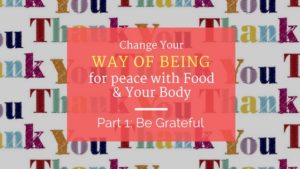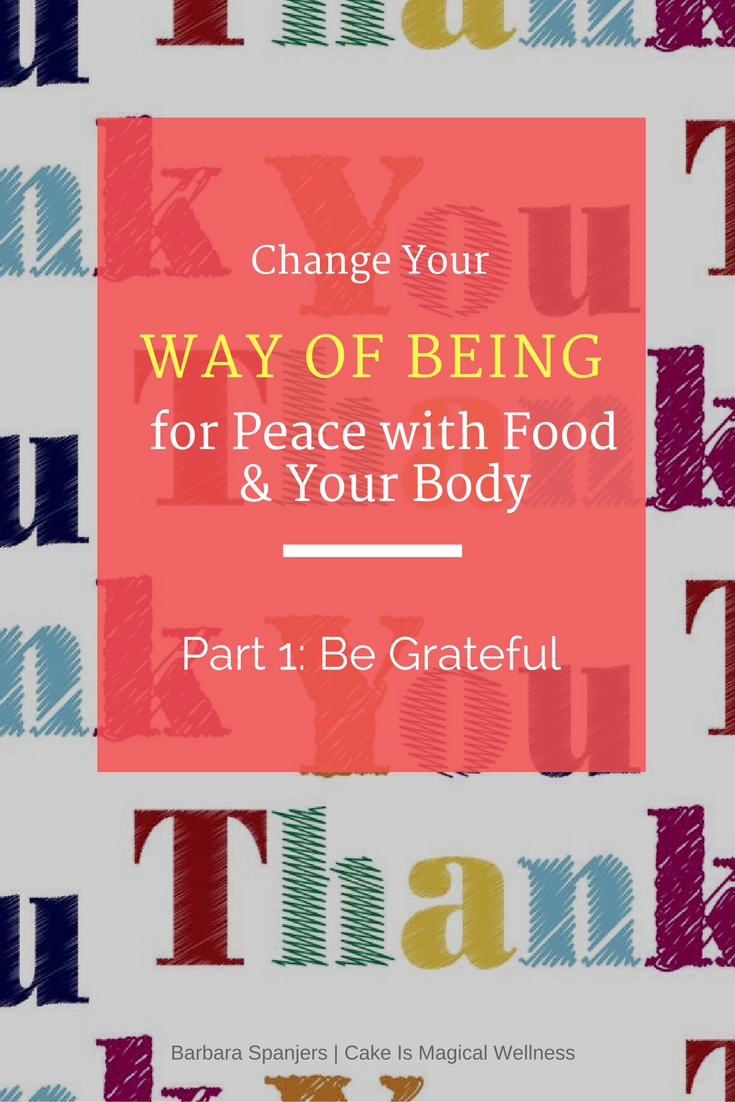 Quick estimate: how much of your time is spent focusing on what you’d like to change about yourself? Or on what you’re unhappy with in your life? Chances are it’s a pretty significant amount of time each day that you can’t get back. I was consulting with a client recently who spends 80% of her time each day worrying about her weight and what she eats. Yes, you read that right: 8-0-%. She beats herself up for not having the willpower to follow through with what she believes is how she should be eating.
Quick estimate: how much of your time is spent focusing on what you’d like to change about yourself? Or on what you’re unhappy with in your life? Chances are it’s a pretty significant amount of time each day that you can’t get back. I was consulting with a client recently who spends 80% of her time each day worrying about her weight and what she eats. Yes, you read that right: 8-0-%. She beats herself up for not having the willpower to follow through with what she believes is how she should be eating.
Does that sound familiar? It’s not a happy place to be. How do you possibly pull yourself out of that kind of obsession and negativity?
Gratitude is a great place to start.
What you focus on expands. So if you’re focused on what you can’t/don’t have, that’s pretty much all you will see. But if you focus on what you do have, positive feelings build up.
Gratitude isn’t just a hashtag on social media. It also has powerful benefits for you. Research links gratitude to better health, higher self-esteem, and emotional wellbeing. For example, a 2003 study published in the Journal of Personality and Social Psychology found that gratitude was a major contributor to resilience following the terrorist attacks on September 11, 2001. Even after one of the most horrific events in recent history, people were able to count their blessings.
Expressing gratitude is popular around the Thanksgiving holiday, but it’s a powerful practice throughout the whole year.
Remember, what you focus on, you amplify. So when you focus on the negative events in your life, that negativity will tend to ooze into all parts of your life. That includes how you eat. In addition to emotional eating, you are less likely to nourish yourself well when you feel crappy.
If you don’t feel like you can find much to be thankful about, start small.
- Do you have a dog who thinks you walk on water? Thank your pup for that. (Seriously, do it. She’ll love it.)
- Is the weather pleasant today? Be grateful for that. Enjoy the sun on your face.
- Or if the weather is harsh today, you could express gratitude for having shelter, or clothes to suit the elements.
Ready to step up your gratitude? Here are some easy practices you can begin incorporating right away.
- Make a list (or even just one thing!) that you’re thankful for today.
- Write a letter to someone you have never properly thanked for something they did.
- Thank a part of your body. Yes, even if you have cellulite. And even if you are ill, injured, or suffer from a chronic health condition. Your body is doing something fabulous for you right now. Your eyes are working hard to read this email to you. Your lungs are filling up with oxygen. If you are alive – and I assume you are 😉 – your body is working to the best of its ability.
- Give thanks for your critical mother, or even your own inner mean girl. When you dig beneath the surface, criticism often stems from a sense of protection. So when your inner critic tells you that you couldn’t possibly succeed at a task, understand that she is probably trying to protect you from negative feelings and social judgment.
The next article of this blog series will focus on being curious for peace with food and your body.
__________________
Resources
- Emmons, R. A., & McCullough, M. E. (2003). Counting blessings versus burdens: An experimental investigation of gratitude and subjective well-being in daily life. Journal of Personality and Social Psychology, 84(2): 377-389.
- Fredrickson, B. L., Tugade, M. M., Waugh, C. E., & Larkin, G. R. (2003). What good are positive emotions in crises? A prospective study of resilience and emotions following the terrorist attacks on the United States on September 11th, 2001. Journal of Personality and Social Psychology, 84(2): 365-376.
- Nelson, C. (2009). Appreciating gratitude: Can gratitude be used as a psychological intervention to improve individual well-being? Counselling Psychology Review, 24(3-4): 38-50.
- Wood, A. M., Joseph, S., & Maltby, J. (2009). Gratitude predicts psychological well-being above the Big Five facets. Personality and Individual Differences, 46(4): 443-447.







